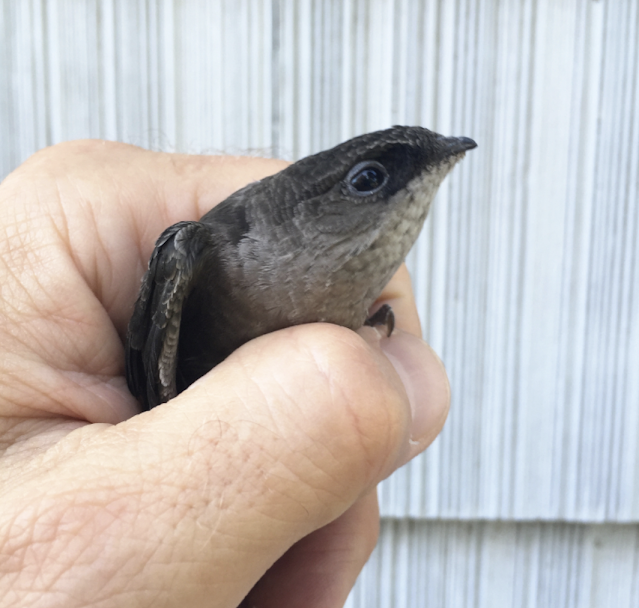Swifts in my Chimney
After only three years in my house, last fall I hired a chimney sweep to clean my family room chimney. Most people have never hired one, even after living in their home for years. But I had swifts nesting in my chimney last summer. The chimney cleaner confirmed that swifts are the birds that roost in chimneys. Mine are either white-throated or Vaux swifts.
Swifts are small, cigar-shaped birds. They are one of the fastest birds on earth (can reach over 60 mph) and use gliding to stay aloft, only flapping their wings to gain momentum. No other bird spends as much of its life in flight. Swifts can spend up to ten months in continuous flight, and it's estimated they fly more than 500 miles each day. They eat, drink, bathe, sleep and mate in flight. Their legs and feet are small and weak and prevent them from perching or walking. A swift that lands on the ground may be unable to regain the air. But, with the aid of sharp claws, they cling to vertical surfaces.
Monogamous pairs often return to the same location to breed every year. They build nests--of airborne material caught in flight--by cementing twigs and moss with their saliva to the dark insides of chimneys or tree cavities. Only one breeding pair in each chimney or tree, laying 2-4 eggs. However the couple can rear up to three broods per season--from March to mid-June.
If you live in Portland you've probably heard of the the Vaux's Swifts that converge by the tens of thousands on the Chapman Elementary School chimney each September to huddle for warmth. They spiral to fly up and down the chimney. This is the beginning of their migration to Central America and it has become a popular viewing event.
I discovered my houseguests by the noise. Especially after the babies were born, sometimes I had to pause the television because they made such a racket. I now realize why they were so active. A single pair can collect over 100 thousand insects daily to feed their young--with up to 1000 insects at a time stored in the back of the parents' throats. An adult swift can eat 5000 insects a day. Fledglings outgrow the nest after about two weeks and have to cling to the nearby wall, sometimes even before their eyes are open.
I think the nest in my chimney may have slipped lower at some point, because the noise got noticeably closer as time went on. But the proof of life came one night as I watched TV. I heard a rustling in the fireplace and discovered a baby bird had fallen. (Thank goodness not a mouse!) I put on a rubber glove to avoid human contamination that might cause the parents to reject it. After a frantic attempt to avoid capture, I finally got my hand around it, felt the tiny heart fluttering in panic, carried it outside and set it in a flower pot. Although it had its feathers, I was afraid it was too young to fly. But when I checked an hour later, it was gone--hopefully back to its parents.
But that wasn't the end of it. A few days later, I heard more rustling--two more fledglings had fallen into the fireplace. For fear they could fly, and would escape into the house, I asked my gardener for help, and we each caught one. Again to the flower pot. These babies were a few days older, and after a few minutes catching their breath, off they flew. There were more than these three in the nest though, because I could still hear the chirping of at least one more baby for several more days. That one must have had a successful test-flight. I'll never know if the parents thought it was time to fledge and shoved them out of the nest, or if they just lost their grip on the wall. Also, if the nest had slipped lower, maybe it was just too soon for the extra-steep flight upward.
Swifts in my chimney
And swallows in the vents
These are my delight
And my distress.
For I beg nature
To invade my space
So I can wonder
And restore.
Like a seed sprouting
Or pinecones at my feet
I have connected the dots
From mine to theirs.
I have mingled
If only for a moment
With my siblings
In all this.
How vast and minute
The starling murmuration
And the honeycomb cell
And I know neither.
I am more for it
And I am less
For how naïve I am
To believe I can consort.




Comments